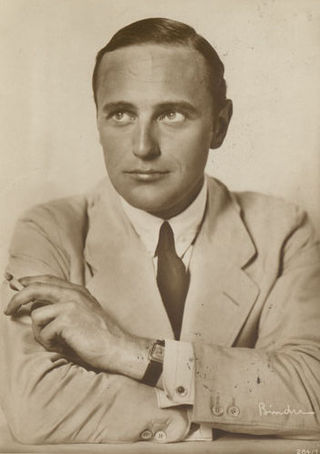
Harry Liedtke was a German film actor.

The Mistress is a 1927 German silent drama film directed by Robert Wiene and starring Edda Croy, Harry Liedtke and Eugen Burg. It was based on a play by Alexander Brody. It was the first film Wiene made after returning to Germany after two years working in Austria, although the film's location shooting was done in Vienna, where the story is set. The interiors were shot at the Marienfelde Studios of Terra Film in Berlin.

The Page from the Dalmasse Hotel is a 1933 German comedy film directed by Victor Janson and starring Dolly Haas, Harry Liedtke and Hans Junkermann. The art direction was by Fritz Maurischat and Hans Minzloff. The film is based on the novel of the same title by Maria von Peteani. It was later adapted into a 1958 Austrian film.
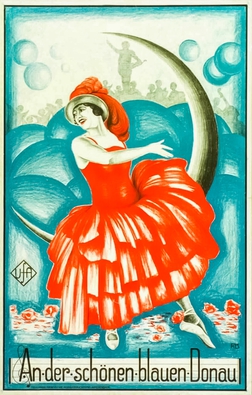
The Blue Danube is a 1926 German silent romance film directed by Frederic Zelnik and starring Harry Liedtke, Lya Mara and Hans Junkermann. The film has been described as a paean to Austria. It was shot at the Staaken Studios in Berlin. The film's art direction was by Andrej Andrejew and Jacek Rotmil who designed the sets.

Marie's Soldier is a 1927 German silent drama film directed by Erich Schönfelder and starring Xenia Desni, Harry Liedtke and Grit Haid. It was shot at the Johannisthal Studios and the backlot of the Babelsberg Studios in Berlin. The film's art direction was by Kurt Richter. The film is based on Leo Ascher's 1913 operetta of the same name.
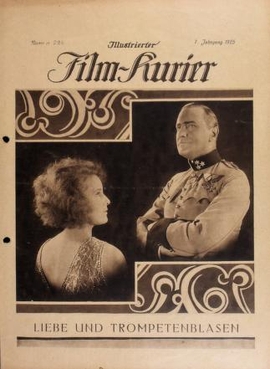
Love and Trumpets is a 1925 German silent comedy film directed by Richard Eichberg and starring Lilian Harvey, Harry Liedtke, and Harry Halm. It was shot at the Johannisthal Studios in Berlin. The film's sets were designed by the art director Kurt Richter.

Nanon is a 1924 German silent historical film directed by Hanns Schwarz and starring Agnes Esterhazy, Harry Liedtke, and Hanni Weisse. It is based on the operetta Nanon by Richard Genée with a libretto by F Zell. The film's sets were designed by the Hungarian art director Stefan Lhotka. The film was remade in 1938 as a sound film of the same name.
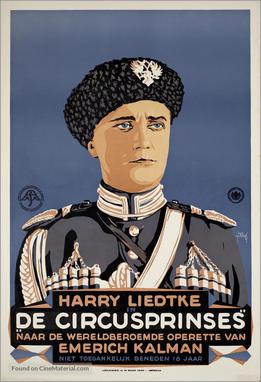
The Circus Princess is a 1929 German silent film directed by Victor Janson. It is an adaptation of the operetta Die Zirkusprinzessin. It was shot at the Staaken Studios in Berlin. The film's sets were designed by the art directors Botho Hoefer and Hans Minzloff

The Big Attraction is a 1931 German musical film directed by Max Reichmann and starring Richard Tauber, Margo Lion, and Marianne Winkelstern. It was made by Bavaria Film at the Emelka Studios near Munich. The film's sets were designed by the art director Hans Jacoby.
Marianne Winkelstern (1910–1966) was a German dancer and actress. She retired and settled in Britain after marrying an Englishman.
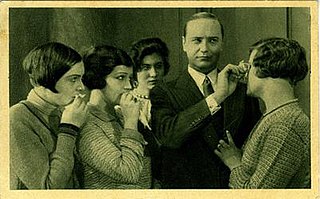
The Black Domino is a 1929 German silent comedy film directed by Victor Janson and starring Hans Junkermann, Vera Schmiterlöw and Max Ehrlich. It is based on the 1837 comic opera Le domino noir. It was shot at the Staaken Studiosin Berlin. The film's art direction was by Botho Hoefer and Hans Minzloff.
The Marriage Nest is a 1927 German silent film directed by Rudolf Walther-Fein and starring Livio Pavanelli, Harry Liedtke, and Wolfgang Zilzer.

The Beggar Student is a 1927 German silent film directed by Jacob Fleck and Luise Fleck and starring Harry Liedtke, Ida Wüst and Agnes Esterhazy. It is an adaptation of Carl Millöcker's operetta The Beggar Student. It was shot at the Staaken Studios in Berlin. The film's art direction was by Botho Hoefer and Hans Minzloff.

The Fate of a Night is a 1927 German silent film directed by Erich Schönfelder.
A Dream of Happiness is a 1924 German silent film directed by Paul L. Stein and starring Harry Liedtke, Ferdinand von Alten and Uschi Elleot.
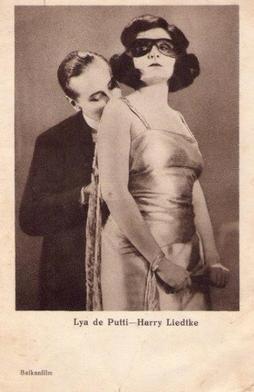
Die Fledermaus is a 1923 German silent film directed by Max Mack and starring Eva May, Lya De Putti and Harry Liedtke. It is an adaptation of the operetta Die Fledermaus by Johann Strauss II, Karl Haffner and Richard Genée.
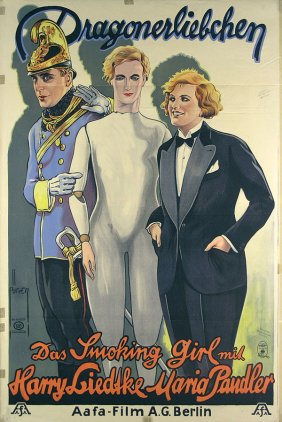
Darling of the Dragoons is a 1928 German silent comedy film directed by Rudolf Walther-Fein and starring Maria Paudler, Harry Liedtke and Fritz Kampers.

Carnival Magic is a 1927 German silent drama film directed by Rudolf Walther-Fein and Rudolf Dworsky and starring Harry Liedtke, Grete Mosheim, and Emil Rameau. It was shot at the Staaken Studios in Berlin. The film's sets were designed by the art directors Hans Minzloff and Jacek Rotmil.

Delicatessen is a 1930 German romance film directed by Géza von Bolváry and starring Harry Liedtke, Georgia Lind, and Ernő Verebes. It was shot at the Tempelhof Studios in Berlin. The film's sets were designed by the art director Robert Neppach. This was Liedtke's talkie debut.

Grandstand for General Staff is a 1926 Austrian-German silent comedy film directed by Hans Otto and Erich Schönfelder and starring Alexander Roda Roda, Harry Liedtke and Olga Chekhova. It is based on a play of the same name.

















